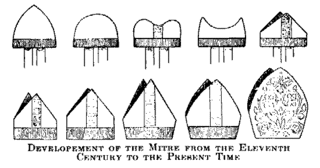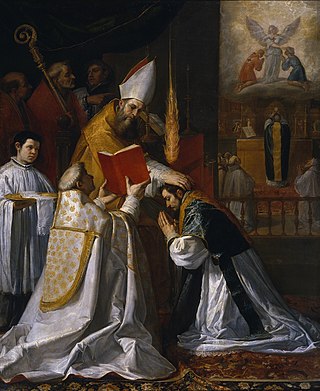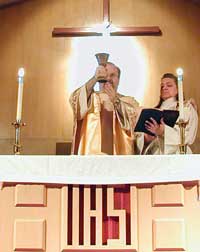Related Research Articles
A bishop is an ordained member of the clergy who is entrusted with a position of authority and oversight in a religious institution.

An episcopal polity is a hierarchical form of church governance in which the chief local authorities are called bishops. It is the structure used by many of the major Christian Churches and denominations, such as the Catholic, Eastern Orthodox, Oriental Orthodox, Church of the East, Anglican, Lutheran and Methodist churches or denominations, and other churches founded independently from these lineages.

In certain Christian denominations, holy orders are the ordained ministries of bishop, priest (presbyter), and deacon, and the sacrament or rite by which candidates are ordained to those orders. Churches recognizing these orders include the Catholic Church, the Eastern Orthodox, Oriental Orthodox, Anglican, Assyrian, Old Catholic, Independent Catholic and some Lutheran churches. Except for Lutherans and some Anglicans, these churches regard ordination as a sacrament.
The United Methodist Church (UMC) is a worldwide mainline Protestant denomination based in the United States, and a major part of Methodism. In the 19th century, its main predecessor, the Methodist Episcopal Church, was a leader in evangelicalism. The present denomination was founded in 1968 in Dallas, Texas, by union of the Methodist Church and the Evangelical United Brethren Church. The UMC traces its roots back to the revival movement of John and Charles Wesley in England, as well as the Great Awakening in the United States. As such, the church's theological orientation is decidedly Wesleyan. It embraces liturgical worship, holiness, and evangelical elements.
The Methodist Episcopal Church (MEC) was the oldest and largest Methodist denomination in the United States from its founding in 1784 until 1939. It was also the first religious denomination in the US to organize itself nationally. In 1939, the MEC reunited with two breakaway Methodist denominations to form the Methodist Church. In 1968, the Methodist Church merged with the Evangelical United Brethren Church to form the United Methodist Church.

The African Methodist Episcopal Zion Church, or the AME Zion Church (AMEZ) is a historically African-American Christian denomination based in the United States. It was officially formed in 1821 in New York City, but operated for a number of years before then. The African Methodist Episcopal Zion Church adheres to Wesleyan-Arminian theology.
A bishop is a senior role in many Methodist denominations. The bishop's role is typically called the "episcopacy", based on the Greek word episkopos (επισκοπος), which literally means overseer. Superintendent is another translation of episkopos but in Methodist churches this is a role distinct from bishop. The first Methodist bishops were appointed in America, and American Methodist denominations still recognize the office of bishop.
Leroy Charles Hodapp distinguished himself as a Methodist pastor, district superintendent, Annual Conference official, and bishop of the United Methodist Church (U.M.C.) who was elected in 1976.
An annual conference is a regional decision-making body within various Methodist denominations. Conferences are a key characteristic of the connectional system of government in Methodism. Annual conferences are composed primarily of the clergy members and a lay member or members from each charge. Each conference is a geographical division. In general, the smaller states in the United States hold one conference each, while larger states often include two or more conferences. Several annual conferences are held in other nations as well.

An elder, in many Methodist churches, is an ordained minister that has the responsibilities to preach and teach, preside at the celebration of the sacraments, administer the church through pastoral guidance, and lead the congregations under their care in service ministry to the world.
In Christianity, an elder is a person who is valued for wisdom and holds a position of responsibility and authority in a Christian group. In some Christian traditions an elder is an ordained person who serves a local church or churches and who has been ordained to a ministry of word, sacrament and order, filling the preaching and pastoral offices. In other Christian traditions, an elder may be a lay person serving as an administrator in a local congregation, or be ordained and serving in preaching or pastoral roles. There is a distinction between ordained elders and lay elders. The two concepts may be conflated in everyday conversation. In non-Christian world cultures the term elder refers to age and experience, and the Christian sense of elder is partly related to this.
Methodist viewpoints concerning homosexuality are diverse because there is no one denomination which represents all Methodists. The World Methodist Council, which represents most Methodist denominations, has no official statements regarding sexuality. British Methodism holds a variety of views, and permits ministers to bless same-gender marriages. United Methodism, which covers the United States, the Philippines, parts of Africa, and parts of Europe, concentrates on the position that the same-sex relations are incompatible with "Christian teaching", but extends ministry to persons of a homosexual orientation, holding that all individuals are of sacred worth.
Superintendent is the title given to a person who is a leader of a Christian denomination at the regional or national level in some Protestant denominations.
The Jurisdictional Conferences are a collection of Annual Conferences of The United Methodist Church located inside the United States.

In Christianity, the ordination of women has been taking place in an increasing number of Protestant and Old Catholic churches, starting in the 20th century. Since ancient times, certain churches of the Orthodox tradition, such as the Coptic Orthodox Church, have raised women to the office of deaconess. While ordination of women has been approved in many denominations, it is still a very controversial and divisive topic.
Methodist views on the ordination of women in the rite of holy orders are diverse.
Grant J. Hagiya is a bishop in the United Methodist Church, having been elected to that position in 2008.

The history of Methodism in the United States dates back to the mid-18th century with the ministries of early Methodist preachers such as Laurence Coughlan and Robert Strawbridge. Following the American Revolution most of the Anglican clergy who had been in America came back to England. John Wesley, the founder of Methodism, sent Thomas Coke to America where he and Francis Asbury founded the Methodist Episcopal Church, which was to later establish itself as the largest denomination in America during the 19th century.
Sharma Lewis is an American bishop in the United Methodist Church. She was consecrated in 2016, and is the resident bishop of the Mississippi episcopal area. She is the first African American woman to be elected as bishop in the UMC's Southeastern Jurisdictional Conference.
The Global Methodist Church is a Methodist denomination of Protestant Christianity subscribing to views consistent with the conservative Confessing Movement. The denomination is headquartered in the United States and has a presence internationally.
References
- ↑ "Church Global Directory". The African Methodist Episcopal Church. Retrieved May 23, 2007.
- ↑ Yrigoyen, Charles Jr.; Warrick, Susan E. (March 16, 2005). Historical Dictionary of Methodism. Scarecrow Press. p. 246. ISBN 9780810865464.
The officice of presiding elder, now called district superintendent in the UMC, was developed in the MEC as an extension of the superintending function of bishops.
- ↑ Wright, Richard Robert; Hawkins, John Russell (1916). Centennial Encyclopaedia of the African Methodist Episcopal Church. p. 354.
- ↑ "The Book of Discipline of the Free Methodist Church" (PDF). Free Methodist Church. 2007. p. 86. Archived from the original (PDF) on April 5, 2015. Retrieved August 18, 2015.
- ↑ "Appendix Nineteen to the Discipline of the Primitive Methodist Church" . Retrieved August 18, 2015.
- ↑ The Book of Discipline of the United Methodist Church 2008: Chapter Three. The Superintendency. Section II. Offices of Bishop and District Superintendent - ¶ 402. Special Ministry, Not Separate Order(retrieved 2 October 2009).
- ↑ The Book of Discipline of The United Methodist Church 2008, ¶418